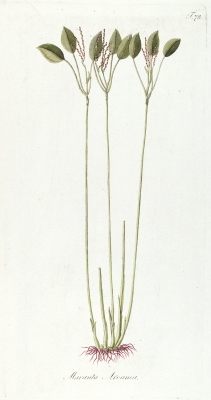Ischnosiphon arouma
(Aubl.) Körn.
Marantaceae
Calathea juncea Spreng.
Hymenocharis arouma (Aubl.) Kuntze
Maranta arouma Aubl.
Maranta juncea Lam.
Common Name:
General Information
Ischnosiphon arouma is a herbaceous perennial plant forming a clump of growth 1.2 - 3 metres tall from an underground rhizome[
356- Title
- The Useful and Ornamental Plants of Trinidad and Tobago.
- Publication
-
- Author
- Williams. R. O. & Williams. R. O. Jnr.
- Publisher
- Self Published in Trinidad and Tobago.
- Year
- 1951
- ISBN
-
- Description
- Terse details of a wide range of plants both native and introduced to Trinidad and Tobago. Gives a brief description of the plant and some of its local uses.
].
The plant is much used in traditional basketry in many of the areas in which it grows, being commonly harvested from the wild. It is also used locally as a source of an edible starch and as a medicine.
Known Hazards
None known
Botanical References
Range
S. America - Brazil, Bolivia, Peru, Colombia, Venezuela, the Guyanas; C. America - Panama; Caribbean - Trinidad, Leeward Islands.
Habitat
An understorey herbaceous plant in forests[
356- Title
- The Useful and Ornamental Plants of Trinidad and Tobago.
- Publication
-
- Author
- Williams. R. O. & Williams. R. O. Jnr.
- Publisher
- Self Published in Trinidad and Tobago.
- Year
- 1951
- ISBN
-
- Description
- Terse details of a wide range of plants both native and introduced to Trinidad and Tobago. Gives a brief description of the plant and some of its local uses.
].
Properties
| Edibility Rating |      |
| Medicinal Rating |      |
| Other Uses Rating |      |
| Habit | Perennial |
| Height | 3.00 m |
| Cultivation Status | Wild |
Cultivation Details
Not known
Edible Uses
The rhizome contains an edible starch[
348- Title
- Medicinal Plants of the Guianas
- Publication
-
- Author
- DeFilipps, R. A.; Maina, S. L.; & Crepin, J.
- Website
- http://botany.si.edu/bdg/medicinal/index.html
- Publisher
- Smithsonian Museum
- Year
- 0
- ISBN
-
- Description
- A down-loadable PDF document of a book in pre-publication awaiting illustration. An excellent, if rather terse, guide to the traditional medicinal uses of the plants of the region
].
Medicinal
The juice of the leaves and stem is caustic and vesicant[
348- Title
- Medicinal Plants of the Guianas
- Publication
-
- Author
- DeFilipps, R. A.; Maina, S. L.; & Crepin, J.
- Website
- http://botany.si.edu/bdg/medicinal/index.html
- Publisher
- Smithsonian Museum
- Year
- 0
- ISBN
-
- Description
- A down-loadable PDF document of a book in pre-publication awaiting illustration. An excellent, if rather terse, guide to the traditional medicinal uses of the plants of the region
].
Other Uses
The long stems are used in basketry and weaving[
920- Title
- Anthropological Papers Nos. 1 - 6
- Publication
- Bureau of American Ethnology. Bulletin 119
- Author
-
- Publisher
- US Government Printing Office; Washington.
- Year
- 1938
- ISBN
-
- Description
-
]. The hard epidermis of the stems is split into 8 - 12 lengths, which are woven into various types of baskets[
476- Title
- Handbook of S. American Indians.
- Publication
- Bureau of American Ethnology, Bulletin 143
- Author
- Steward J. H. (Editor)
- Website
- http://www.biodiversitylibrary.org
- Publisher
- US Government Printing Office; Washington
- Year
- 1946 - 1950
- ISBN
-
- Description
- In six volumes, a detailed look at the native peoples of S. America - their culture, lifestyle, use of plants etc,
,
592- Title
- Contributions to The Flora of Venezuela.
- Publication
-
- Author
- Steyermark J.A. Et al
- Website
- http://www.biodiversitylibrary.org
- Publisher
- Chicago Natural History Museum; Chicago.
- Year
- 1951 - 1957
- ISBN
-
- Description
- An excellent flora, though made at a time when botanical knowledge of the areas was still very lacking.
]. The stems are spread out to dry in the sun for several days before being used. Without this process, during which they acquire an agreeable red russet colour, the stems would soon become brittle and unworkable. Some of them are subsequently steeped for a couple more days in 'mudholes' by the riverbank, where they take on a fine shiny black. The blackened stems are, however, less strong than those not so treated. Before use, each stem is split in four or six strands which are then drawn between a knife blade and the finger until the pith is removed and they have been made fine enough for the work in view. If white strands are wanted, as for the linings of Carib panniers, they may be obtained by scraping the outer surface of red strands, or merely by laying these inner side uppermost[
920- Title
- Anthropological Papers Nos. 1 - 6
- Publication
- Bureau of American Ethnology. Bulletin 119
- Author
-
- Publisher
- US Government Printing Office; Washington.
- Year
- 1938
- ISBN
-
- Description
-
].
An oil from the seed is used as a hair cosmetic[
348- Title
- Medicinal Plants of the Guianas
- Publication
-
- Author
- DeFilipps, R. A.; Maina, S. L.; & Crepin, J.
- Website
- http://botany.si.edu/bdg/medicinal/index.html
- Publisher
- Smithsonian Museum
- Year
- 0
- ISBN
-
- Description
- A down-loadable PDF document of a book in pre-publication awaiting illustration. An excellent, if rather terse, guide to the traditional medicinal uses of the plants of the region
].
Propagation
Seed -
If you have any useful information about this plant, please leave a comment. Comments have to be approved before they are shown here.






 Useful Tropical Plants Database 2014 by
Ken Fern,
web interface by
Ajna Fern
with help from
Richard Morris.
Useful Tropical Plants Database 2014 by
Ken Fern,
web interface by
Ajna Fern
with help from
Richard Morris.